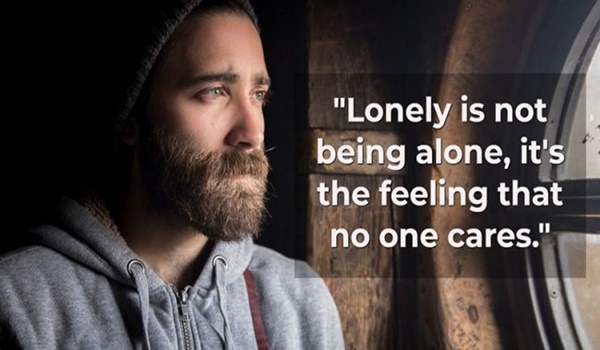Loneliness is a normal human emotion, but when it starts to interfere with everyday life, it is an issue that needs to be addressed as soon as possible.
It is a strong feeling of abandonment or rejection that arises in response to isolation. A lonely person feels detached, distressed, and vulnerable. People who lack family ties or have lost their lifelong partner or a friend are most prone to feeling lonely and singled out in the world.
Yet, it is a fact that all of us have experienced some degree of abandonment, if only for a short time, and know the painful and scary feeling that accompanies it. Loneliness can be confusing and can easily put you off your game if you don’t know what’s going on.
Rosanne Ritchie, a Toronto-based psychotherapist, claims that the distinction between feeling lonely and being alone is important. She says that being alone is a state that can offer mental and physical freedom and a lot of people enjoy being alone.
On the other hand, actual loneliness is a feeling of isolation and emotional abandonment and these people feel as though nobody’s there for them, nobody understands them and their feelings are not being considered.”
Researchers were surprised to find out that a lot of people feel lonely even though the Americans are considered to be happy and normal as a nation.
Namely, a San Diego study that involved 304 adults aged between 27 and 101 found that an average of 3 out of every 4 of the participants were dealing with some form of mild to severe loneliness.
Additionally, the AARP’s Loneliness Study, which surveyed adults ages 45 and older, found that more than 35 percent of older adults are lonely, and loneliness is a significant predictor of poor health.
The report of the study showed that lonely people are less likely to be involved in social events, which in turn contributes to poor health, as being social is crucial for our mental, physical, and emotional well-being. Loneliness has also been linked to the following consequences:
- 59 percent higher risk of mental and physical decline
- 45 percent increase in the risk of death
- Development of brain biomarkers associated with Alzheimer’s
- The need for long-term care and nursing homes
Yet, many people hide these feelings and even their closest relatives and friends are unaware of the burden they carry. Therefore, it is important to learn to recognize the most common symptoms of loneliness:
1. Weakened immune system
Lonely people often feel drained, and suffer from fatigue and physical lag. They feel too heavy and painful to move around, and studies have found that their immune systems are weakened and frequently fall sick.
2. Depression
Lonely people often show symptoms of depression, such as fatigue, anxiety, sleep issues, appetite loss, chronic sadness, lack of concentration and depletion in self-esteem.
3. Self-medication
Many drug addicts are simply lonely people who are seeking a way to escape their loneliness.
4. Taking lengthy baths in hot water
Even though the warmth they need is emotional, many lonely people tend to spend longer in hot baths in order to fulfill this need.
5.Binge-watching television
A 2015 study conducted by the University of Texas discovered that people who showed the strongest signs of loneliness spent a lot of time binge-watching television series, watching countless numbers of episodes and movies in a way to fight isolation.
6. Lonely friends
Loneliness is contagious, so lonely people prefer spending their time in the company of isolated people and individuals who do not like to interact.
7. Compulsive buying disorder
Materialism is a defense mechanism against the unpleasant feelings of loneliness, so these people are prone to excessive, uncontrolled shopping and impulse purchases.
— Accept your emotions and decide to change your life
— You need to reach out and connect to people you trust, without feeling ashamed for asking help or become overprotective out of the fear from being rejected
— Heal your heart and get the tranquility your mind and body crave for, by taking yoga classes, reading, swimming, spending time in nature, or do whatever activity you enjoy
— It is always beneficial to talk about the thing that bothers you, so join a group where you can share your experiences with people in a similar situation
— Stop worrying if you fit in or stand out, do all necessary to connect with people around you, and you will gradually acquire a sense of belonging again
— You need to find activities that interest you and bring positivity in your life
— Break out of your comfort zone and get out more, explore, cross your boundaries
— Try writing down all your thoughts and feelings at the end of the day, and this will help you release negativity and unfold the solutions to your problems
— Explain to others how you feel and teach them the way you want to be loved and appreciated, without playing the victim card
— To channel positive energy back into your life, engage in physical therapy, exercise, meditation, yoga, or karate.


